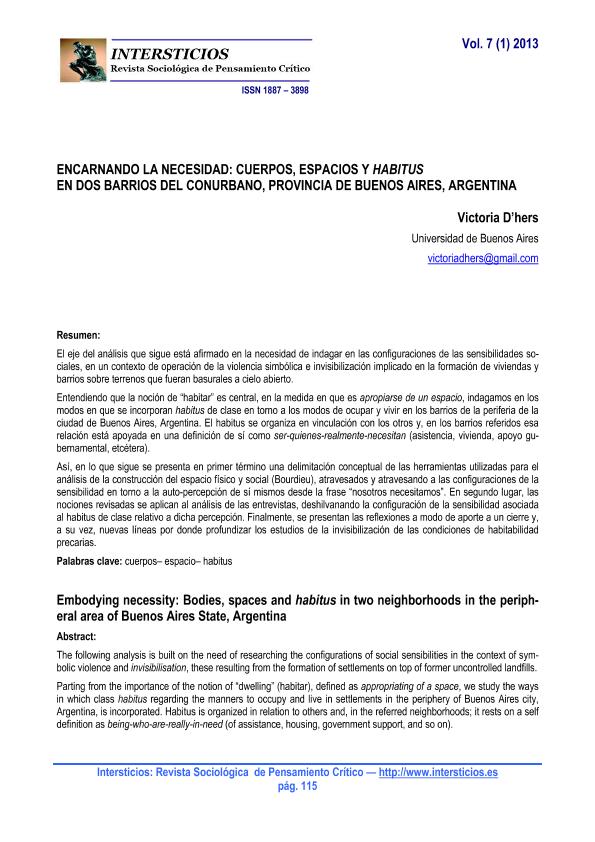Artículo
El eje del análisis que sigue está afirmado en la necesidad de indagar en las configuraciones de las sensibilidades sociales, en un contexto de operación de la violencia simbólica e invisibilización implicado en la formación de viviendas y barrios sobre terrenos que fueran basurales a cielo abierto. Entendiendo que la noción de “habitar” es central, en la medida en que es apropiarse de un espacio, indagamos en los modos en que se incorporan habitus de clase en torno a los modos de ocupar y vivir en los barrios de la periferia de la ciudad de Buenos Aires, Argentina. El habitus se organiza en vinculación con los otros y, en los barrios referidos esa relación está apoyada en una definición de sí como ser-quienes-realmente-necesitan (asistencia, vivienda, apoyo gubernamental, etcétera). Así, en lo que sigue se presenta en primer término una delimitación conceptual de las herramientas utilizadas para el análisis de la construcción del espacio físico y social (Bourdieu), atravesados y atravesando a las configuraciones de la sensibilidad en torno a la auto-percepción de sí mismos desde la frase “nosotros necesitamos”. En segundo lugar, las nociones revisadas se aplican al análisis de las entrevistas, deshilvanando la configuración de la sensibilidad asociada al habitus de clase relativo a dicha percepción. Finalmente, se presentan las reflexiones a modo de aporte a un cierre y, a su vez, nuevas líneas por donde profundizar los estudios de la invisibilización de las condiciones de habitabilidad precarias. The following analysis is built on the need of researching the configurations of social sensibilities in the context of symbolic violence and invisibilisation, these resulting from the formation of settlements on top of former uncontrolled landfills. Parting from the importance of the notion of “dwelling” (habitar), defined as appropriating of a space, we study the ways in which class habitus regarding the manners to occupy and live in settlements in the periphery of Buenos Aires city, Argentina, is incorporated. Habitus is organized in relation to others and, in the referred neighborhoods; it rests on a self definition as being-who-are-really-in-need (of assistance, housing, government support, and so on). Thus, in this paper first we display a conceptual delimitation of the used notions for the analysis of the physical and social space (Bourdieu). This space penetrates and is penetrated by the sensibilities’ configurations around the self-perception condensed in the phrase “we are in need”. Secondly, the revised concepts are applied to the study of the interviews carried out from 2007 to 2011, unraveling the configuration of the sensibility associated to the class habitus of such perception. Finally, reflections are presented as a mean to contribute to closing and, at the same time, opening of new lines from where to deepen the investigations on the invisibilisation of precarious housing arrangements.
Encarnando la necesidad: cuerpos, espacios y habitus en dos barrios del conurbano, Provincia de Buenos Aires, Argentina.
Título:
Embodying necessity.: bodies, spaces and habitus in two neighborhoods in the peripheral area of Buenos Aires State, Argentina
Fecha de publicación:
02/2013
Editorial:
Universidad Complutense de Madrid
Revista:
Intersticios
ISSN:
1887-3898
Idioma:
Español
Tipo de recurso:
Artículo publicado
Clasificación temática:
Resumen
Palabras clave:
Cuerpos
,
Espacios
,
Habitus
Archivos asociados
Licencia
Identificadores
Colecciones
Articulos(SEDE CENTRAL)
Articulos de SEDE CENTRAL
Articulos de SEDE CENTRAL
Citación
D'hers, Victoria; Encarnando la necesidad: cuerpos, espacios y habitus en dos barrios del conurbano, Provincia de Buenos Aires, Argentina.; Universidad Complutense de Madrid; Intersticios; 7; 1; 2-2013; 115-130
Compartir




